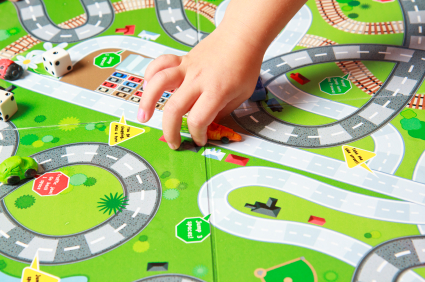We must accept finite disappointment, but never lose infinite hope.
— Martin Luther King, Jr.
Do you remember the old Game of Life?
On hot boring summer days when I was a kid, we'd get out the tattered game box, choose our tiny plastic station wagons and spin the wheel. We'd plug our armless peg spouses and children in the holes in the car's backseat, and meander our way through "Life" to the rest home at the end of the board's path.
The real Game of Life doesn't have an instruction booklet, game pieces or too many clear guidelines.
And in the past week, after a big professional goof up, some disappointments, news of a friend's cancer diagnosis, and then, Boston, I've had a tiny urge to peek over my shoulder – just to see what might be gaining on me.
It feels like a measure of my own growth and personal development that while I could have seen a big chunk of this past week as a failure or series of losses, I didn't.
I felt stupid, disappointed, sad and heartbroken – in some measure, in different combinations at different times – but none of it broke me.
Instead, I apologized, fixed, comforted, hugged, cried, and got to work on what is next for each of the situations I was facing.
So, what's the path through disappointment and loss?
1) Name it. Life is a big gamble and entails risk just in showing up for it. The only thing that is guaranteed in life is change. The nature of life entails unknown and sometimes painful territory, risk and loss. It's an part of the deal with being a human being.
2) Feel it. Nothing poisons our internal well more than harboring disappointment, fear or anger over the long term. By allowing yourself to actually feel your feelings (sometimes loudly and overtly) in the moment, you can more quickly process your experience and move on.
3) Ask for help. Do I sound like a broken record on this yet? Let other people in where you can and let them help you.
4) Choose and act. Taking charge of what is in your control, and doing what you can, even if it is small, gets you out of victim mode and back in the game.
Below, it's your turn. Tell me:
– What do you do in the face of disappointment and loss?
If you enjoyed this post, get updates emailed directly to you…. it's free!


 Before specializing as a professional coach in 2004, I spent more than a decade in leadership, management and program development for state and local government and non-profit organizations. Now I get to help leaders and teams have more clarity and ability to stand up for what's important in their work and in their organizations. Working with me, leaders and teams find more meaning and purpose, feel happier and more confident, navigate change and conflict, and work together better.
Before specializing as a professional coach in 2004, I spent more than a decade in leadership, management and program development for state and local government and non-profit organizations. Now I get to help leaders and teams have more clarity and ability to stand up for what's important in their work and in their organizations. Working with me, leaders and teams find more meaning and purpose, feel happier and more confident, navigate change and conflict, and work together better.
I could not have said it better. From what I could tell you handled your setbacks like a champ, so proud of you! Like I said in my post last week, it’s easy to lead when things are going great…not so easy when it’s tough but that’s where your capacity as a leader is proven. Loved this article!
Thanks, Natasha! Love having you in the fan club! : )
Hanna, I appreciate that you are so comfortable sharing your own humanity, including the challenges and occasional foibles. It highlights your strength and expertise, as well as gives an authentic example of walking the talk. Letting go of mistakes is hard for me and ultimately holds me back. Moving forward from the challenges and seeing them in the context of the big picture will help me be more productive and, ultimately, more satisfied with life.
Well, it seems like your posts generally strike me as useful and needed. I’ve had a particularly rough day, and decided I had to do what I needed to in order to take care of myself. It meant that I took half a day’s vacation – but I was no good to anyone today. Oh well.. Tomorrow will be a new day and a good nights sleep will serve me well . . .
Thanks for the validation.
Thanks, Nancy! To be honest, this post (and the last) weren’t easy to write, but I hope that offering these I can dispel some myths we often to hold onto! Letting go isn’t easy for most of us, and I applaud you for being willing to look for the big picture view! You can do this! : )
Hey Elaina, self-care and knowing when to take a break is one of the most important and often neglected part of leadership and life, especially on a rough day.
So kudos to you for knowing and trusting yourself to know when it’s been enough. Rest well and thanks for your comment!
Hey, Hanna: In answer to your question: I admit it. I stew and process. Then I reprocess. I’ve gotten a little better recently by asking myself, “Can I change it?” If I can’t try to move on. Otherwise, paralysis of analysis. Ugh! Love the Life boardgame analogy!
Denise, thanks for your honesty! Love the “can I change it?” mantra – that’s a great litmus test! Glad for your comment and fresh perspective!
For me, I include acknowledging fear. Unknown and uncertainty create fear which in turn causes many other spin-offs: anger, indecision, reluctance, etc. Taking action, like you said, even a small one, helps empower you to get back up.
Great point, Heidi – fear is often at the root. Naming it as such is critical! Thanks for your insight!